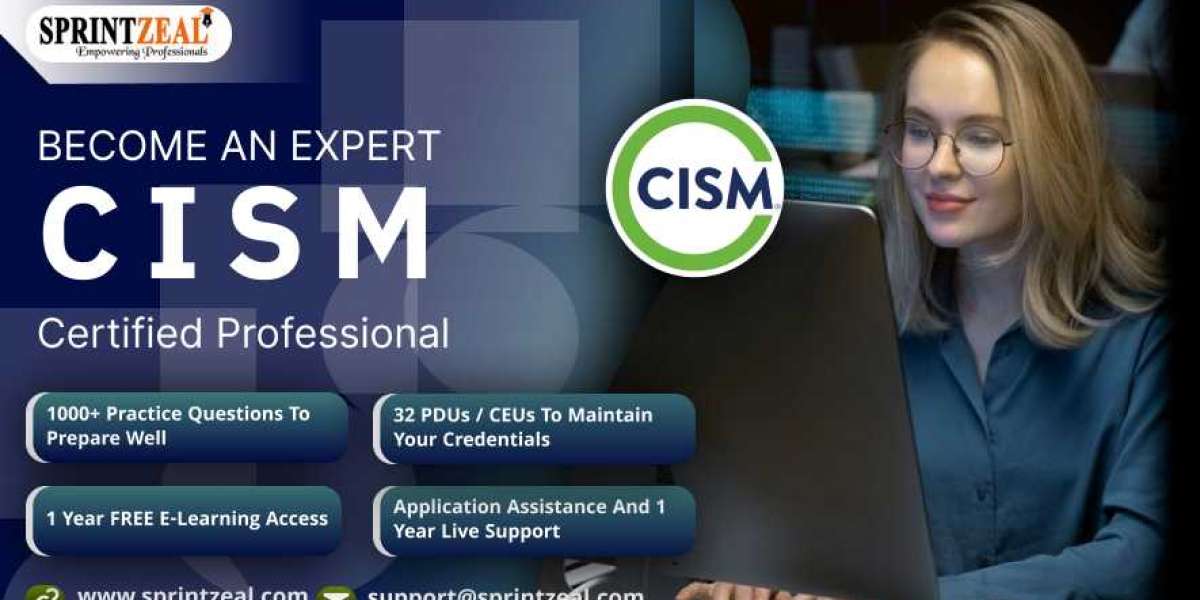In the dynamic landscape of cybersecurity, professionals seek validation of their expertise through certifications. Among the many available, the Certified Information Security Manager (CISM) credential stands out as a hallmark of proficiency in managing, designing, and assessing an organization's information security program. However, achieving CISM certification requires diligent preparation and strategic study methods. In this comprehensive guide, we'll delve into effective strategies, resources, and tips to help you navigate the path to CISM success.
Understanding the CISM Exam
Before diving into study strategies, it's essential to comprehend the structure and content of the CISM exam. Developed and administered by ISACA (Information Systems Audit and Control Association), the CISM exam assesses candidates across four domains:
- Information Security Governance
- Information Risk Management
- Information Security Program Development and Management
- Information Security Incident Management
Each domain carries a specific weightage in the exam, and candidates must demonstrate proficiency across all areas to pass. Understanding the domains' nuances and their respective importance is crucial for effective study planning.
Developing a Study Plan
Crafting a structured study plan is paramount for success in the CISM Certification exam. Here's a step-by-step guide to help you create an effective study schedule:
Assessment: Begin by assessing your current knowledge and skills against the CISM domains. Identify your strengths and weaknesses to allocate study time accordingly.
Set Goals: Establish clear, realistic goals for each study session and overall exam preparation timeline. Break down your goals into manageable tasks to maintain focus and motivation.
Allocate Time: Dedicate consistent time slots for studying each domain, ensuring balanced coverage across all areas. Factor in regular breaks to prevent burnout and maintain productivity.
Utilize Resources: Gather a variety of study resources, including textbooks, online courses, practice exams, and supplemental materials. Choose resources that align with your learning style and preferences.
Practice, Practice, Practice: Regularly engage in practice questions and simulated exams to familiarize yourself with the exam format and refine your time management skills.
Review and Adapt: Continuously evaluate your progress and adjust your study plan as needed. Focus additional attention on areas of weakness while reinforcing your strengths.
Recommended Study Resources
Selecting the right study resources can significantly impact your exam preparation journey. Here are some highly recommended resources for studying for the CISM exam:
Official ISACA Materials: Start with the official CISM Review Manual and CISM Review Questions, Answers Explanations Database provided by ISACA. These resources offer comprehensive coverage of exam content and practice questions developed by experts.
Online Courses and Training: Enroll in reputable online courses specifically designed for CISM preparation. Platforms like Udemy, Coursera, and Pluralsight offer comprehensive CISM courses taught by industry professionals.
Study Guides and Books: Supplement your studies with well-reviewed CISM study guides and books. Look for publications authored by recognized experts in the field, such as "CISM Certified Information Security Manager All-in-One Exam Guide" by Peter H. Gregory.
Practice Exams: Access a variety of practice exams to simulate the exam environment and gauge your readiness. ISACA offers official practice exams, while other platforms like Boson and Transcender also provide quality practice questions.
Peer Discussion and Forums: Join online forums and discussion groups dedicated to CISM exam preparation. Engaging with peers allows you to share insights, clarify doubts, and gain valuable perspectives.
Effective Study Strategies
In addition to utilizing study resources, implementing effective study strategies can enhance your comprehension and retention of exam content. Here are some proven strategies to optimize your study sessions:
Active Learning: Actively engage with the material by taking notes, summarizing key concepts, and teaching the content to others. Incorporate active learning techniques like mnemonics and concept mapping to reinforce understanding.
Spaced Repetition: Employ spaced repetition techniques to review and reinforce learning over time. Schedule regular review sessions for previously studied material to enhance long-term retention.
Real-World Application: Relate theoretical concepts to real-world scenarios and practical experiences. Understanding how concepts apply in actual organizational settings enhances comprehension and critical thinking skills.
Group Study Sessions: Collaborate with peers or study groups to discuss challenging topics, share insights, and quiz each other. Explaining concepts to others not only reinforces your understanding but also exposes you to different perspectives.
Healthy Habits: Prioritize self-care and maintain healthy habits throughout your exam preparation journey. Get adequate sleep, exercise regularly, and nourish your body with nutritious food to optimize cognitive function and concentration.
Final Exam Preparation Tips
As the exam date approaches, focus on refining your exam-taking strategies and ensuring peak performance on exam day:
Simulated Exams: Take full-length simulated exams under timed conditions to simulate the actual exam experience and build endurance. Analyze your performance and identify areas for improvement.
Time Management: Practice effective time management strategies to allocate time wisely across exam questions. Prioritize questions based on difficulty and allocate sufficient time for review.
Exam Logistics: Familiarize yourself with exam logistics, including the testing center location, exam format, and required identification documents. Arrive early on exam day to minimize stress and ensure a smooth experience.
Confidence and Relaxation: Maintain a positive mindset and approach the exam with confidence. Practice relaxation techniques such as deep breathing or visualization to alleviate test anxiety and promote focus.
Review and Double-Check: Utilize any remaining time to review your answers and double-check for accuracy. Pay attention to details and ensure you've addressed all aspects of each question.
Conclusion
Preparing for the CISM certification exam requires dedication, perseverance, and strategic planning. By following a structured study plan, leveraging quality resources, and implementing effective study strategies, you can increase your chances of success and achieve your certification goals. Remember to stay focused, maintain a healthy balance, and trust in your preparation as you embark on this rewarding journey towards becoming a Certified Information Security Manager.








